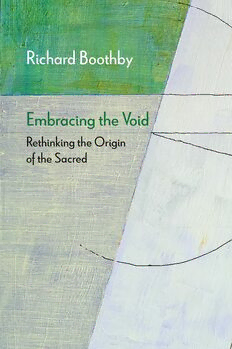
Embracing the Void: Rethinking the Origin of the Sacred PDF
Preview Embracing the Void: Rethinking the Origin of the Sacred
EMBRACING THE VOID Series Editors Slavoj Žižek Adrian Johnston Todd McGowan diaeresis E M B R A C I N G T H E V O I D Rethinking the Origin of the Sacred Richard Boothby Northwestern University Press Evanston, Illinois Northwestern University Press www.nupress.northwestern.edu Copyright © 2023 by Northwestern University. Published 2023 by Northwestern University Press. All rights reserved. Brief passages included in this book were originally published in “The No- Thing of God: Psychoanalysis of Religion after Lacan” in The Oxford Handbook of Philosophy and Psychoanalysis, edited by Michael Lacewing and Richard Gipps (Oxford: Oxford University Press, 2018), and have been reproduced by permis- sion of Oxford University Press. Printed in the United States of America 10 9 8 7 6 5 4 3 2 1 Library of Congress Cataloging- in- Publication Data Names: Boothby, Richard, 1954– author. Title: Embracing the void : rethinking the origin of the sacred / Richard Boothby. Other titles: Diaeresis. Description: Evanston, Illinois : Northwestern University Press, 2023. | Series: Diaeresis | Includes bibliographical references and index. Identifiers: LCCN 2022023700 | ISBN 9780810145382 (paperback) | ISBN 9780810145399 (cloth) | ISBN 9780810145405 (ebook) Subjects: LCSH: Psychoanalysis and religion. | Philosophy and religion. | Holy, The. | Nothing (Philosophy) | BISAC: PHILOSOPHY / Religious | PHILOSOPHY / Movements / Post– Structuralism Classification: LCC BF175.4.R44 B67 2023 | DDC 200.1/9— dc23/ eng/20220824 LC record available at https://lccn.loc.gov/2022023700 For my wife, Rebecca Nichols, my darling, die- hard atheist Contents Preface: Is Nothing Sacred? 1 Introduction: Reposing Freud’s Final Question 3 Part 1. Rereading Lacan (or, What Is the Other?) 1 Religion from Freud to Lacan 9 2 The Abyss of the Other 23 3 The Ex Nihilo of the Signifier 47 Part 2. Rethinking Religion (or, What Is the Sacred?) 4 Greek Polytheism: The Worship of Force 69 5 Judaism: The Worship of Law 103 6 Christianity: The Worship of Love 130 7 Other Paths, Other Gods 163 8 Conclusions 191 Notes 203 Bibliography 225 Index 233 Preface Is Nothing Sacred? The soul has to go on loving in the void. — Simone Weil Over the centuries, human beings have probably expended more thought, time, energy, and passion entangled with religion than with any other enterprise beyond brute survival. Were Martian explorers to visit Earth, they would report to their fellow Martians that the two- legged animal is also, and maybe above all, the animal that worships. But what exactly is worship? Throughout human history, the dizzying array of cultic, ritual, and spiritual practices have failed to coalesce into any palpable unity. If anything, tensions between differing religious viewpoints now seem more pitched than ever. One might well ask whether it is possible to conceive of the notion of the sacred as a unitary phenomenon. This book risks the assertion that the “varieties of religious experi- ence,” as William James called them, do indeed share a common core. Yet the task of excavating that common nucleus must contend with two major challenges that are internal to the effort. The first challenge ac- companies the central premise of the argument that follows, which pro- poses that the religious impulse is uniquely illuminated by the lessons of psychoanalysis. For any reader acquainted with Freud’s scathing critique of religious belief that choice of approach will certainly seem dubious, if not downright nonsensical. Exposed to Freud’s unrelenting hostility, readers with even a modest religious inclination are inevitably tempted to ask: “Is nothing sacred?” Also problematic is the fact that psychoanalysis itself has for a long time been a target of critique by a wide range of detractors, among them droves of feminists, humanists, behaviorists, geneticists, neuroscientists, and pharmacologically inclined psychiatrists. In many corners of the academy, and nearly everywhere on the street, Freudian theory seems to be a stock in decline. One wonders: Does the Freudian legacy still have anything valuable to offer? 1
